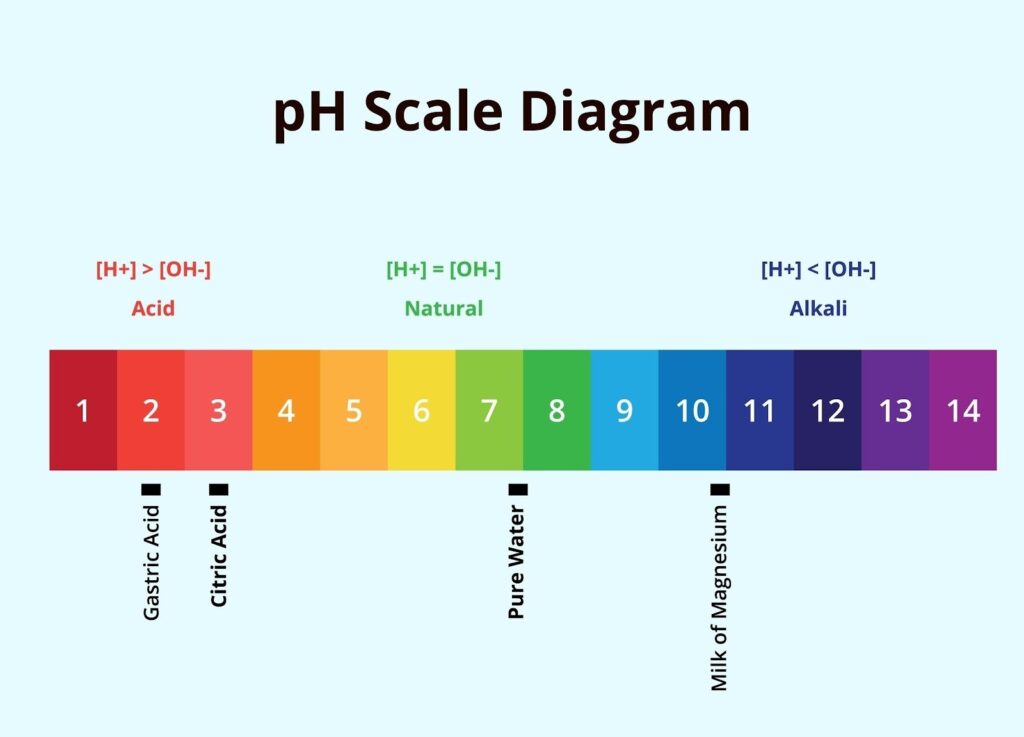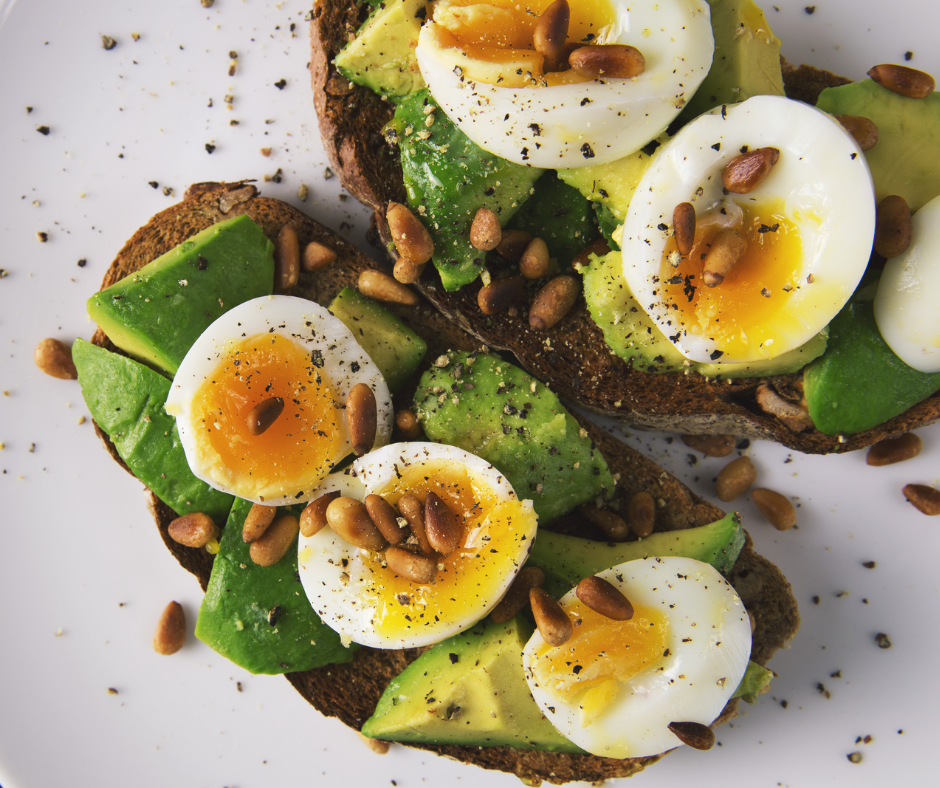TL;DR / Quick Answer:
- Are eggs acidic? On their own, fresh eggs are chemically near-neutral but slightly acidic, with a pH of about 6.5.
- Do eggs cause acid reflux? For most people, no. Eggs are generally considered a “safe” food for acid reflux and are a staple of low-acid diets. The way you cook them (e.g., frying in fat) is what typically causes symptoms.
- Are eggs acidic or alkaline in the body? In the context of the “alkaline diet,” eggs are considered acid-forming. This is because they are high in sulfur-containing amino acids that produce a type of acid as a metabolic byproduct. This process does not affect your stomach acid or your blood’s pH.
Are Eggs Acidic or Alkaline? The Science of pH
First, let’s answer the literal, scientific question. This is for the “chemically curious” among us.
What is pH?
The pH scale is a simple way to measure how acidic or alkaline (also called basic) a substance is. The scale runs from 0 to 14:
- 0: Highly Acidic (like battery acid)
- < 7: Acidic (like lemon juice or black coffee)
- 7: Perfectly Neutral (like pure water)
- > 7: Alkaline/Basic (like baking soda or bleach)
- 14: Highly Alkaline

The Chemical pH of an Egg
So, where do eggs fall on this scale? It’s not as straightforward as you’d think, as the different parts of an egg have different properties.
- Egg Yolk: The yolk of a fresh egg is acidic, with a pH of around 6.0 to 6.4.
- Whole Egg (Blended): When you blend the yolk and white, a fresh whole egg is slightly acidic, with a pH of approximately 6.5 to 6.8. This is very close to neutral.
- Egg White (Albumen): This is the surprising part. A fresh egg white is slightly acidic (around 6.5). However, as an egg ages, it “breathes” through its shell, releasing carbon dioxide. This loss of CO2, which is acidic, causes the egg white’s pH to rise. An older egg white can become highly alkaline, with a pH as high as 9.0. This is a natural process that has little bearing on nutrition.
Conclusion: Chemically, fresh eggs are very close to neutral but lean slightly on the acidic side.
Now, let me be perfectly clear: this chemical pH has almost no impact on your body, your stomach acid, or your overall health. The next two sections explain the concepts that really matter.
The Real Question: Do Eggs Cause Acidity or Acid Reflux (GERD)?

This is the most important section for the vast majority of people reading this. You’re not a chemist; you’re someone who had heartburn last night and is now staring at your breakfast, wondering, “Are these eggs the problem?”
Let’s get straight to the answer.
The Verdict: Eggs are a GERD-Friendly Food
For the vast majority of people, eggs do NOT cause acidity or trigger acid reflux. In fact, as a gastroenterologist, I recommend eggs as a “safe” food for most of my GERD patients.
They are a staple of low-acid diets for several key reasons:
- They are a Lean Protein: Protein is generally well-tolerated and is less likely to trigger reflux than high-fat or high-carb meals.
- They are Low in Acid: As we just discussed, their chemical pH is near-neutral. They are not an “acidic food” in the same way as tomatoes, citrus, or coffee.
- They are Satiating: Eggs keep you feeling full and satisfied. This is a huge benefit for GERD sufferers, as overeating is one of the biggest triggers for reflux. A full stomach puts physical pressure on the lower esophageal sphincter (LES)—the valve that keeps acid in your stomach—forcing it open.
The Real Trigger: How You Cook Them (The Fat Problem)
If eggs themselves aren’t the problem, why do some people swear they get heartburn after an egg breakfast?
The answer isn’t the egg; it’s the fat you cook it with.
Fat is a major trigger for acid reflux. It does two things:
- It relaxes the lower esophageal sphincter (LES), making it easier for acid to splash up.
- It slows down stomach emptying (a process called “gastric emptying”). This means food sits in your stomach longer, giving acid more time to build up and cause problems.
So, let’s look at your egg breakfast again:
- Good for GERD: Poached eggs, hard-boiled eggs, or scrambled eggs (cooked in a non-stick pan with no butter/oil, or just a tiny amount).
- Bad for GERD: Fried eggs (swimming in butter or oil), or a big omelet loaded with full-fat cheese, sausage, and bacon.
In these “bad” examples, it’s not the egg causing the problem. It’s the high-fat-delivery-system you’ve turned the egg into.
What About “Are eggs acidic in the morning?”
This is a great question because it reveals a symptom. If you have reflux in the morning after breakfast, you’re right to investigate. But your (poached or boiled) eggs are likely not the culprit.
Look at what else is on your breakfast table:
- Coffee: Highly acidic and a known muscle relaxant for the LES. A major trigger.
- Orange Juice: Extremely acidic (pH ~3.5).
- Lying Down: Did you eat a huge breakfast and then lie down on the couch? This physical position is a recipe for reflux.
If you have morning reflux, try this experiment: Eat only two hard-boiled eggs. See how you feel. The next day, drink only coffee. See how you feel. I can almost guarantee which one will cause the “acidity.”
The “Alkaline Diet” Myth: Are Eggs Acidic in the Body?

Now we come to the third, and most confusing, concept. This is for the “alkaline diet” followers. You may have seen a chart that lists eggs as “acidic” or “acid-forming.”
This is true. And it has absolutely nothing to do with your stomach acid.
Let me explain.
A Completely Different Question
The “alkaline diet” theory isn’t concerned with a food’s chemical pH. It’s concerned with a food’s “Potential Renal Acid Load” (PRAL).
This is a scientific measure of how much acid or alkali a food produces after your body completely metabolizes it. This “acid load” must then be filtered by your kidneys and excreted in your urine.
- Alkaline-forming foods (like fruits and vegetables) leave behind alkaline byproducts. They have a negative PRAL score.
- Acid-forming foods (like meat, cheese, and grains) leave behind acidic byproducts. They have a positive PRAL score.
Eggs are Highly Acid-Forming (High PRAL)
On the PRAL scale, eggs are acid-forming.
Why? Eggs are a rich source of protein, which is made of amino acids. Two of these amino acids, methionine and cysteine, are high in sulfur. When your body metabolizes these sulfur-containing amino acids, the byproduct is sulfuric acid—a strong acid that your kidneys must filter.
This is why, in the context of the alkaline diet, eggs are considered “acidic.”
Debunking the Myth (Crucial for E-A-T)
Now, we must address the central myth of the alkaline diet. As a medical professional, I need to be very clear.
You CANNOT change your blood pH with diet.
Your body maintains your blood pH in a critically tight, slightly alkaline range (7.35 to 7.45). This is called homeostasis. If your blood pH falls outside this range, you are not “a little acidic”; you are in a state of medical emergency (like metabolic acidosis or alkalosis) and likely in the ICU. Your body has powerful buffering systems (in your blood, lungs, and kidneys) to ensure this never happens.
So, what can you change with diet?
You can change your urine pH.
If you eat a steak and some eggs (both acid-forming), your urine will become more acidic. This is not a sign that your “body is acidic.” It is a sign that your kidneys are working perfectly. They are efficiently filtering the acid byproducts and expelling them from your body, exactly as they are designed to do.
Conclusion: While eggs are technically “acid-forming” (high PRAL), this is not “bad” or “unhealthy.” It is a normal metabolic process that your healthy kidneys can handle with ease. This concept has zero connection to stomach acid or GERD.
Acidic vs. Alkaline: How Do Different Egg Preparations Compare?
This section is vital for capturing all the specific ways people search for this topic. Let’s put all three concepts together.
The Simple Answer: The cooking method does not change the chemical pH or the PRAL value of the egg itself.
What it does change is the fat content and the add-ins, which is the only thing that matters for acid reflux.
Here is a simple table to answer your question, no matter how you cook your eggs.
| Egg Preparation | Chemical pH (For Trivia) | PRAL Score (For “Alkaline Diet”) | Acid Reflux (GERD) Trigger? (The Real Question) |
| Raw Egg | Slightly Acidic (~6.5) | Acid-Forming | No. (But not recommended due to Salmonella risk). |
| Hard-Boiled Egg | Slightly Acidic | Acid-Forming | No. An excellent GERD-friendly option. |
| Poached Egg | Slightly Acidic | Acid-Forming | No. An excellent GERD-friendly option. |
| Scrambled Egg (Plain) | Slightly Acidic | Acid-Forming | No. A very safe option. |
| Scrambled Egg (with Milk/Butter) | Slightly Acidic | Acid-Forming | Maybe. Depends on the amount of fat. Use skim milk and a tiny bit of butter. |
| Fried Egg (in Oil/Butter) | Slightly Acidic | Acid-Forming | Yes! This is a high-fat preparation and a common trigger. |
| Omelet (with Cheese & Ham) | Slightly Acidic | Acid-Forming | Yes! High fat (from cheese) and processed meat are both common triggers. |
| Egg Whites | Alkaline (if aged) | Acid-Forming (less than yolk) | The Safest Option. Virtually zero fat. Many patients with severe GERD tolerate egg whites perfectly. |
The “What Else Should I Eat?” Cluster: Comparing Eggs to Other Foods
To make this the ultimate guide, let’s build on what we’ve learned and apply our 3-part framework to other common foods. This will help you build a complete, GERD-friendly diet.
Is Chicken Acidic?
- Chemical pH: Chicken meat is acidic (pH ~5.8-6.0).
- GERD: Like eggs, lean chicken (baked, grilled, poached) is an excellent food for acid reflux. It’s a staple lean protein. The problem, again, is the fat. Fried chicken is a major trigger.
- Alkaline Diet (PRAL): Like all meat, chicken is highly acid-forming.
Is Fish Acidic?
- Chemical pH: Most fish is acidic (pH ~6.2-6.6), very close to eggs.
- GERD: An excellent choice. Low-fat fish like cod, tilapia, and haddock are extremely well-tolerated. Even higher-fat fish like salmon is full of healthy fats and is usually fine for most people, but if you are very sensitive, you may want to test it in small portions.
- Alkaline Diet (PRAL): All fish is acid-forming.
Is Bread Acidic?
- Chemical pH: Bread is acidic (pH ~5.0-6.0). Sourdough is even more acidic.
- GERD: This is a common trigger for many people. It’s not just the acidity; large amounts of processed carbohydrates can ferment in the stomach, causing bloating and pressure on the LES. Whole-grain bread is generally a better choice than white bread.
- Alkaline Diet (PRAL): Grains are acid-forming.
A GERD-Sufferer’s Food List: Alkaline & Low-Acid Options
If you have GERD, you want foods that are both not chemically acidic and not high in fat. Incidentally, many of these are also “alkaline-forming.”
Here are the Top 10 Alkaline and GERD-Safe Foods I recommend to my patients:
- Melons: Cantaloupe and honeydew are wonderfully alkaline (pH 6.1-6.5) and soothing.
- Bananas: A classic low-acid fruit.
- Oatmeal: Fantastic. It’s a whole grain that absorbs stomach acid.
- Leafy Greens: Spinach, kale, and chard are all alkaline-forming and nutritious.
- Root Vegetables: Potatoes, sweet potatoes, and carrots are complex carbs that are great for GERD (just don’t fry them).
- Cauliflower & Broccoli: These are alkaline-forming and full of fiber.
- Ginger: A natural anti-inflammatory that can help digestion. Drink it as a tea.
- Almonds / Almond Milk: A great, alkaline-forming alternative to fatty dairy.
- Fennel: This low-acid, crunchy vegetable has a licorice flavor and has been shown to help soothe digestion.
- Lean Proteins: Egg whites, skinless chicken breast, and white fish.
What is the least acidic thing you can eat?
This is a common question from patients in pain.
- Answer: The least acidic foods are neutral or alkaline. This includes:
- Water (pH 7.0)
- Oatmeal
- Melons
- Green Vegetables
- Lean, un-fried proteins like egg whites and chicken.
Top Acidic Foods to AVOID for GERD
In my practice, these are the “Big 8” triggers.
- Tomatoes and tomato-based products (pasta sauce, salsa)
- Citrus fruits (oranges, lemons, grapefruit)
- Coffee (both caffeinated and decaf)
- Alcohol
- Onions and Garlic (especially raw)
- Spicy Foods
- Chocolate
- Peppermint (it relaxes the LES)
Frequently Asked Questions (FAQ)
Q: Are eggs acidic or bad?
A: Eggs are not bad. They are one of the most nutritious foods available. They are chemically slightly acidic (near neutral) and metabolically “acid-forming” (in the context of the alkaline diet). Neither of these things is a reason to consider them “bad” for your health.
Q: Are eggs high in acid?
A: No, eggs are not high in acid. They are a low-acid food with a pH close to neutral (around 6.5). Foods like lemons (pH 2.0) or coffee (pH 4.5) are high in acid.
Q: How to tell if your body is alkaline or acidic?
A: You cannot. This is a common myth. Your body’s blood pH is kept in a strict, non-negotiable range (7.35-7.45) by your lungs and kidneys. You can test your urine pH, but this only shows what your kidneys are filtering out—it does not reflect your body’s overall “acidity” or health.
Q: Are scrambled eggs acidic or alkaline?
A: Scrambled eggs are chemically slightly acidic (like all fresh eggs). For acid reflux, they are a very safe, non-triggering food as long as you don’t cook them in a lot of butter or oil.
Q: Are hard-boiled eggs acidic or alkaline?
A: Hard-boiled eggs are chemically slightly acidic. They are considered one of the best and safest foods to eat if you have acid reflux because they contain zero added fat, are a great source of lean protein, and are easy to digest.
The Final Verdict: Should You Eat Eggs?
As a gastroenterologist, my answer is a resounding yes.
Let’s recap the three different “answers” to “are eggs acidic?”:
- For Science (Chemical pH): Eggs are near-neutral, leaning slightly acidic. This fact is mostly for trivia and has no real impact on your health.
- For Acid Reflux (GERD): Eggs are a great choice. They are a safe, low-acid, high-protein food that is a cornerstone of a GERD-friendly diet. Just do not fry them in fat. Choose hard-boiled, poached, or scrambled (no fat).
- For the Alkaline Diet (PRAL): Eggs are acid-forming. This is a normal metabolic process. It is not harmful, it does not make your “body acidic,” and it has nothing to do with stomach acid. It just means your kidneys are doing their job.
My Final Recommendation:
Please continue to eat eggs. They are one of the most nutritious, affordable, and versatile foods on the planet.
If you have acid reflux, they are one of the safest and most satisfying proteins you can choose. If you are getting heartburn after breakfast, I promise you, it’s almost certainly not the egg. It’s the fat you cooked it in, the coffee you drank with it, or the orange juice you had before it.
Focus on a diet rich in whole foods, lean proteins, fruits, and vegetables. Your body, from your stomach to your kidneys, is more than capable of handling the rest.
References
- American Egg Board. (n.d.). pH Stability.
- National Institute of Diabetes and Digestive and Kidney Diseases (NIDDK). (2020). Eating, Diet, & Nutrition for GER & GERD.
- American College of Gastroenterology (ACG). (n.d.). Acid Reflux/GERD.
- Surdea-Blaga, T., et al. (2019). The role of diet in the development and management of gastroesophageal reflux disease: why we feel the burn. PubMed Central.
- Gutiérrez-Salmerón, M., et al. (2019). Dietary acid load: Mechanisms and evidence of its health repercussions. Nefrología.
- Fenton, T. R., & Huang, T. (2016). Systematic review of the association between dietary acid load and health. Annals of Nutrition & Metabolism.
Medical Disclaimer: This article is for informational and educational purposes only. It does not constitute medical advice, nor is it a substitute for diagnosis or treatment from a qualified healthcare professional. If you have severe GERD, unexplained symptoms, or other health concerns, please consult your doctor or a registered dietitian.


